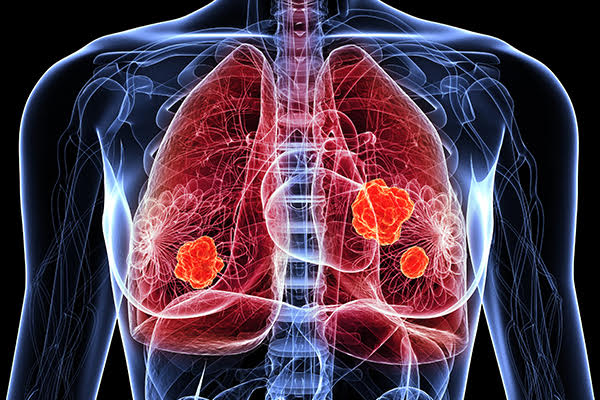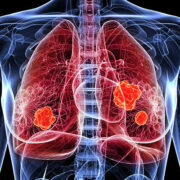
In an attempt to challenge the cultural stigma associated with lung cancer, change expectations, and empower the lung cancer and Asian American communities, a panel of cancer experts gathered at a virtual webcast on October 29 as part of AstraZeneca’s “It’s Okay To Ask” educational lung cancer program.
The “It’s Okay To Ask” program was designed to empower lung cancer patients and their caregivers to take a proactive approach to treatment. In line with this, AstraZeneca held a panel discussion entitled “Lung Cancer Among Asian Americans: Challenging the Stigma & Changing Expectations” to build public awareness on the disease.
The panel was moderated by Dr. Elaine Shum, an oncologist from Perlmutter Cancer Center in New York.
She was joined by Dr. Songchuan Guo, an oncologist from the Icahn School of Medicine at Mount Sinai in New York; Dr. Kin Lam, a hematologist/oncologist from Mount Sinai Beth Israel Medical Center and New York-Presbyterian Hospital in New York; Dr. Young Kwang Chae, an oncologist from the Feinberg School of Medicine at Northwestern Medicine in Chicago; and Chef Ming Tsai, restaurateur, author, and host of PBS-TV’s Simply Ming.
Lung cancer and its stigma
Lung cancer continues to be the leading cause of cancer death among men and women worldwide. There are two types of it — non-small cell lung cancer (NSCLC), the most common type of lung cancer, and small cell lung cancer (SCLC).
“As we all know, lung cancer is not just one disease. With ongoing research, we’re really finding out that there’s just so much about lung cancer that we don’t know, but there is a lot that we do know about it,” said Shum.
“One of the misconceptions is that lung cancer is the smoker’s disease,” she added.
According to Shum, most people think that lung cancer is only seen in patients who smoked cigarettes before. Because of that, lung cancer carries the stigma that a patient might have brought this disease upon themselves if they were a smoker, or that they’re to blame for getting the diagnosis.
A 2018 survey revealed that 56% of the U.S. population thinks that lung cancer patients are at least partly to blame for their illness. Meanwhile, 67% of oncologists surveyed and reported that lung cancer patients blame themselves.
The survey also found that more than 70% of patients felt stigmatized.
“Stigma may prevent patients from sharing their diagnosis. Feelings of shame and guilt may lead to treatment delays or no treatment at all,” Shum said.
In Asian-centric communities, research shows that some lung cancer patients in China experience discrimination, isolation and exclusion, causing them to hide their diagnosis in some cases. Some Chinese lung cancer patients may feel guilt or shame for their smoking, for missing work, or for being unable to care for themselves and their family.
“Lung cancer is a very difficult and dire diagnosis, regardless of a person’s ethnicity. In Asian culture, the stigma of lung cancer may make it more difficult for some patients to fully confront the disease. They may not want to burden others, so they deny or hide their diagnosis, causing them to miss potential treatment or intervention,” Lam said.
“We must overcome misconceptions and the social stigma of lung cancer by educating patients that it’s okay to communicate openly about the disease and actively participate in their care,” he added.
Biomarker testing
In understanding lung cancer, knowing the patient’s stage is important for their treatment option.
Approximately 30% of patients diagnosed have resectable disease (stage 1 to 3), while about 70% of NSCLC present with advanced disease either locally (stage 3) or often metastatic (stage 4).
The panel noted that the discovery and development of biomarkers and biomarker testing has impacted the treatment of metastatic NSCLC patients. Biomarkers have been identified as factors that cause lung cancer. By identifying the biomarker, it may lead to more effective treatment outcomes.
One of the most common biomarkers in metastatic NSCLC is the mutations in the EGFR (epidermal growth factor receptor) gene.
EGFR mutations are the most common driver mutations in Asian patients with NSCLC adenocarcinomas. A total of 59.4% NSCLC patients have EGFR mutations, in contrast to only 10-15% of NSCLC patients in the U.S. and Europe.
Based on a study, Vietnam has the highest incidence of EGFR mutations in Asian countries at 64%. This is followed by Taiwan (57%), Thailand (54%), Hongkong (53%), and the Philippines (52%).
“Biomarker testing for lung cancer is important in patients with metastatic disease, particularly in subsets of the population where we know mutations like EGFR occur more often, such as in Asian Americans,” Guo said.
Biomarker testing is done in two ways — tissue biopsy, where tissue is taken and tested from the tumor; and blood test, also known as liquid biopsy or plasma test.
“The results of these tests may allow us to select a targeted therapy that may be effective against a patient’s specific form of lung cancer,” Guo added.
Behavior changes
Ming, whose wife was diagnosed with metastatic NSCLC, shared how his family overcame the disease by changing their lifestyle.
Aside from oral chemotherapy, his wife also did acupuncture, energy work, massage, as well as changed her diet.
“We decided through all our research that we were going to eliminate sugar immediately.
Cancer feeds off on sugar. Go gluten-free as much as possible, and go vegan,” Ming said.
“How you react to a circumstance like this matters just as much as the actual therapy,” he stressed.
Ming noted that reducing the stress that his wife felt also helped a lot. Currently, his wife “is feeling great, looking great.”
“I can’t emphasize how important the support group is as well,” he said, adding that their family, parents, and close friends were what kept them going.
Ming expressed his support for AstraZeneca’s “It’s Okay To Ask” program, urging the public to educate themselves about lung cancer.
“Cancer doesn’t discriminate. It can happen to anyone of any race,” he said.
“Be your own advocate and find the information and get to the doctor because there’s a huge difference between stage 1 and stage 4. It’s okay to ask,” he added.
Chatrick Paul, SVP and head of U.S. oncology at AstraZeneca, for his part said: “Hopefully, today’s event is the start of a longer dialogue aimed at reducing health disparities for Asian Americans living with lung cancer. We must work together to continue educating, raising awareness, and finding solutions for combating barriers to timely and appropriate care for these patients.” (Ritchel Mendiola/AJPress)







